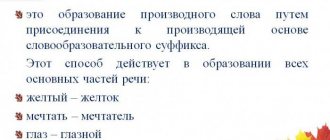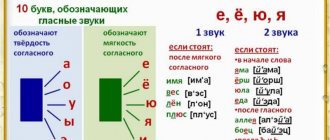Today the weather is stormy
And I'm so unhappy.
The rain is absolutely terrible.
It would soon become clear again
And the red sun would shine,
And it would be wonderful all around!
Nobody likes rainy weather because you can't go out and play with your friends. What to do while sitting at home when it’s raining outside? Maybe study how unpronounceable consonants at the root of words are written?
Choose a test word
Let's play the test word game. For each of the examples below, select a test cognate word
- famous, messenger, agenda (news, message, news, message);
- sad (sadness, be sad);
- hello (health, health, healthy);
- starry (star, asterisk);
- cabbage (cabbage);
- locality (place, place);
- inclement (inclement weather);
- late (to be late, late);
- joyful (joy);
- whistle (whistle, whistle);
- heart (heart, heart);
- sun (sunny);
- reed (reed);
- participant (participation);
- honest (honor);
- dangerous (fear);
- wonderful (miracles);
- terrible (terrible);
- interesting (interesting).
Second graders begin to study the unpronounceable consonants at the roots of words. 2nd grade should already be able to select test words.
How to check for an unpronounceable consonant in a word?
In such cases, the spelling of a word with an unpronounceable consonant requires verification. Regardless of pronunciation, the required letter should be written in the root, maintaining the integrity of the morpheme. To this end, we will use two methods to make sure whether there is an unpronounceable consonant in a word.
To correctly write a word with an unpronounceable consonant, you need to change its form or select a related word so a vowel sound .
For a consonant sound, if there is a vowel after it strong, that is, then the consonant being tested is heard clearly and distinctly.
The position of an unpronounceable consonant also becomes strong at the end of a word and in cases where it is followed by an unpaired sonorant sound (l, m, n, r, th):
- sun - sunny;
- happy - happiness (e = [ th' e], before th );
- agency - agent;
- lean (food) - fasting;
- pitiful - pity.
For example, when pronouncing the words “sad”, “bone”, “furious” in the cluster of consonant sounds “stn” the sound “t” disappears. To write them correctly, we will use the spelling rule outlined above:
- sad - sad, sad, sad;
- bone - bone, bone, bones, ossify;
- furious - furious, furious.
See more examples of words with unpronounceable consonants.
Words to remember with unpronounceable consonants
It is not always possible to apply the rule. There are words in which the unpronounceable consonants at the root of the word cannot be checked. They are called dictionary, their spelling needs to be learned:
- staircase - a series of steps or rungs;
- holiday - a day when a significant event is celebrated;
- feelings – internal experience, emotional state;
- peers - people of the same age;
- peers is a synonym for the word “peers”.
What are unpronounceable consonants?
In the Russian language, when pronouncing some words, not all consonants are sounded in their roots.
In a number of lexemes, there are unpronounceable clusters of consonant sounds between vowels:
- vstv (hello, feel, clear, virgin),
- zdn (celebrate, holiday, late, late, abyss, starry),
- ndsk (Dutch, Scottish, Finnish),
- ntsk (giant, diplomatish, amateurish),
- stl (laid, happy, conscientious, sympathetic),
- stn (valiant, provincial, furious),
- lnz (sun),
- rdc (heart),
- stsk (racist, nationalist)
and others.
When pronouncing some words in the indicated consonant groups, one of them, indicated by the letter “v”, “d”, “t” or “l”, is dropped.
Consonants that are not pronounced at the root of a word are called unpronounceable .
Let's see what unpronounceable consonants are in the words:
- heart [s' er c e]
- gigantic [g' i ga n s k' and y']
But in written speech, unpronounceable consonants must be designated. Indeed, when the grammatical form changes or in a word with the same root, unpronounceable consonants manifest themselves:
- heart - hearty, heart
- gigantic - giants
Find words that have unpronounceable consonants at the root of the word
It is necessary to develop the ability to find words with unpronounceable consonants among others. This requires training. Here are sentences, find words in them with unpronounceable consonants.
- Snowdrop is the herald of spring.
- A joyful cry announced victory.
- The lovely rose petals spread a wonderful aroma.
- Prince Charming is waiting for Cinderella in the palace.
- The starry sky stretches to the very horizon.
- The cabbage butterfly is the most terrible enemy for gardeners.
- My brother received a summons from the military registration and enlistment office.
- Spring turned out to be late and cold.
- It was easy to hide in the reeds.
- We lived in the countryside at that time.
These sentences use words with different spellings, among them “Unpronounceable consonants at the root of the word”, examples of such words: messenger, joyful, charming, wonderful, beautiful, starry, cabbage, agenda, late, reeds, localities.
A set of spelling exercises “Unpronounceable consonants at the root of a word”
Exercise 1.
Rewrite the words, choosing for each of them a word with the same root, in which the root is followed by a vowel.
Voiceless, delicious, powerful, gigantic, sorrowful, bulky, valiant, provincial, interesting, commandant, selfish, bone, local, daughter-in-law, hateful, rainy, patroller, neighborhood, dangerous, agenda, send, post, charming, biased, peer, whistle, heart, verbal, sun, reed, terrible, participate, whip, crunch, integral, honor, wonderful, oral, patronize, obvious, furious.
Task 2.
Choose the option with the unpronounceable consonant
D
:
A. malicious violator;
B. surrounding forests;
C. bulky closet;
D. rare exhibit;
E. whip…what a speech.
Task 3.
Choose the option with the unpronounceable consonant
T
:
A. great mood;
B. wonderful day;
C. traffic safety;
D. lovely girl;
E. atmosphere of publicity.
Task 4.
Choose the option with the unpronounceable consonant
T
:
A. meeting of peers;
B. friendship of peers;
C. interesting interlocutor;
D. skilled craftswoman;
E. shine in the heights.
Task 5.
Choose a word with an unpronounceable consonant
B
:
A. honor heroes;
B. participate in the tournament;
C. I ... really hear;
D. delicious food on the table;
E. walk above the class.
Task 6.
Choose the option where the word with the unpronounceable consonant
D
:
A. Trouble depended on his envy.
B. Without work there cannot be a clean and joyful life..
C. Honest... dishonest is not a friend.
D. A man is powerful with his heart, a tree with his roots.
E. The secret known to the three is no longer a secret.
Task 7.
Insert missing letters where necessary. Choose test words.
Honest answer, interesting book, simple words, forest review, crossfire, viral infection, sailing, watch face, reed thickets, crisis situation, verbal art, tasteless food, an experienced rider, friendship of peers, my son’s peers, honoring a guest, feeling tired.
Task 8.
Fill in the missing letters. Write these words in two columns: with an unpronounceable consonant and without an unpronounceable consonant.
Woeful, arboreal, voiceless, dangerous, virtuous, unbearable, impartial, integral, furious, backwater, uncontrollable, skillful, shameless... ny, gigantic, vile... , peer... nik, peer... nick, harb...nik, pedagogue... to, participate, whip... n, crunch... n, edible, silence..., surroundings, roundabout, agency, locality, hooligan, champagne.
Task 9.
Rewrite by inserting the missing letters. Indicate test words in brackets.
1. The hall was warily silent. 2. Another two hundred steps - and we are safe. ( Arsenyev
) 3. Autumn was late this year.
( Korolenko
) 4. Dudnikov thrust the shovel into the ground with such force that the handle cracked.
( Sholokhov
) 5. Among the eight children there was one the same age as me.
( Herzen
) 6. Here, on stoves and on braziers, various dishes were fried and boiled, sizzling.
( Goncharov
) 7. Lack of money chained me to the village that I hated.
( Tolstoy
) 8. The accordionist played so recklessly, with such skillful modulations, that the old man could not resist the temptation to listen.
( Markov)
9. My whole family is in good health and sends their greetings to you.
( Chekhov
) 10. It smelled of dry hot clay and nearby pasture.
( Fedin
) 11. The squadron honored its heroes.
( Stepanov
) 12. He also took part in the glorious Battle of Borodino.
( Kuprin
) 15. The soldiers watched with disinterested curiosity where the planes would fly.
( Kazakevich
)
We recommend reading:
Children's fitness Phonetics Therapeutic physical education 5th grade Russian language Test No. 1 on the topic “Linguistics.
Phonetics" (according to the Lvov program) Entertaining mathematics Share with friends:
Divide the words into two groups
| -stn- | -sn- |
Words for distribution: ne...y (heavenly), svi...y (whistle), dreve...y (woody), kol...y (wheeled), must...y (oral), inter...y (interesting), hru...ut ( crunch), zap...oh (spare), viru...y (viral), glad...y (joyful), consonant (consonant), ko...y (bone).
This task helps develop the ability to classify words according to their orthographic characteristics: whether there is an unpronounceable consonant at the root of the word or not.
What is a paired consonant?
All consonants are in one opposition or another with each other according to their characteristic features. One of them is the contrast between sounds based on deafness and voicedness.
Some consonants, while all other features coincide, such as the place of formation and the method of pronunciation, differ only in the participation of the voice in the sound process. They are called pairs. The remaining consonants do not have a voiceless-voiced pair: l, m, x, ts, ch, shch, y.
| Paired consonants | examples of words with paired consonants | |
| Voiced (involving voice) | Deaf (no voice) | |
| [b] | [P] | tables[b]s - table[p] |
| [V] | [f] | dro[v]a - dro[f] |
| [G] | [To] | doro[g]a - doro[k] |
| [d] | [T] | boro[d]a - boro[t]ka |
| [and] | [w] | blah[zh]it - blah[sh] |
| [h] | [With] | frosty[z]ny - frosty[s] |
Paired consonants are given here. The table also contains examples that illustrate the spelling “Verified consonants in the root of a word.”
Puzzles
Let's play riddles. You need to guess and write down the last word in the sentence:
- At dawn, _______________(sun) peeks through the window.
- My love will open the door in your ____________(heart).
- On a frosty night, lights burn in the _____________ (starry) sky.
- He is a known truth-teller, he will not tolerate lies, because he is __________ (honest).
- On the shore in the water, _______________ (reeds) are rustling and swaying.
- I will give the rabbit a juicy and tasty _______________(cabbage) leaf.
This task will be interesting to complete when studying the topic “Unpronounceable consonants at the root of a word.” 3rd graders will cope with this work easily and fun.
Mini dictations
Now let's write a little dictation. Choose any:
Morning
It's a beautiful morning! It just rained. The cabbage beds are washed and fresh. The sun's rays warm up, and the damp earth smells good. My heart is happy from this beautiful morning. Hello summer!
Unsuccessful hunt
The hunt was unsuccessful. It was a stormy day. The sun disappeared behind the clouds, and a sad light rain began to fall. We got out of the forest. The area was known to us. The village herd grazed on this pasture in the summer. A shepherd's hut was visible nearby. We will rest in it after an unsuccessful hunt.
Spring came
The stormy days are over and spring has arrived. The birds are singing cheerfully, the sun is warming, the streams are babbling joyfully. The area was covered with grass, lilies of the valley bloomed under the trees. The buds on the trees opened. Hello Spring!
All these dictations are intended to test knowledge on the topic “Unpronounceable consonants at the root of words.” 3rd grade should cope with such tasks.
Insert words in the text
There was a very interesting text, but the letter-eating beetle ate some of the letters in the words. What to do? It is necessary to return the original form to words that have unpronounceable consonants at the root of the word.
A famous writer wrote a story about a prince who was invincible in battles. The word...the portrait speaks of the weak...character and terrible appearance of the prince. This prince took part in the campaign and was exposed to dangers. He himself was so cruel that he only spared one old man once.
One day after the victory, he arranged a festive feast. The table was bursting with delicious...i..tv. But the joyful feast was interrupted. The world disappeared behind the clouds and the weather began to get hot. A strong wind blew, thunder roared, and lightning flashed. The prince felt severe pain, and then fell to the ground unconscious. Groo... but this story would have ended, but then a sorcerer appeared. He was the same age as the century. This old magician miraculously revived the prince and said: “Hello, prince! You once saved me from death, I returned the debt to you!”




